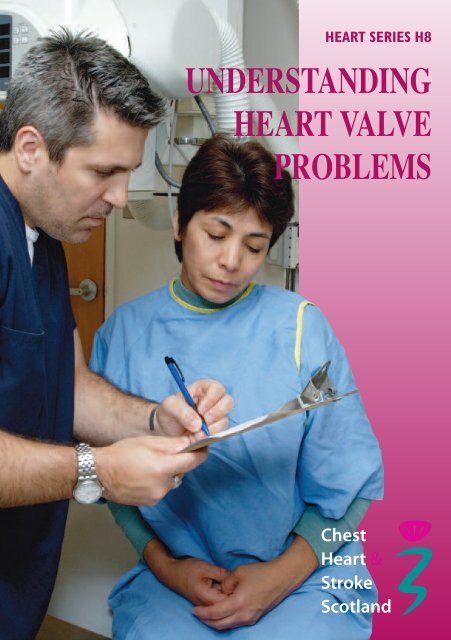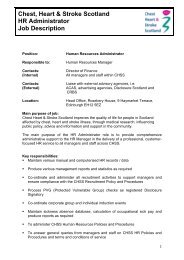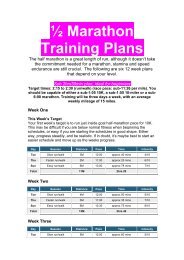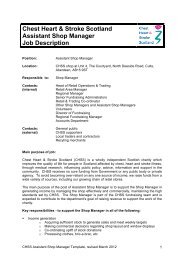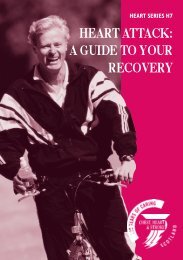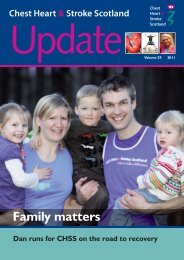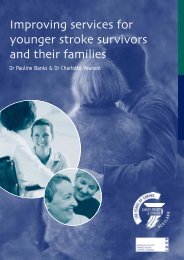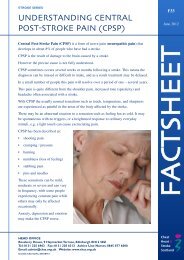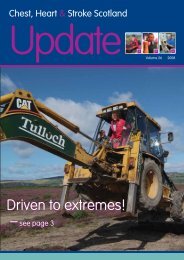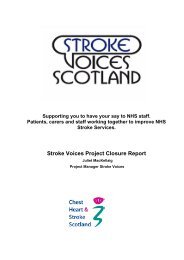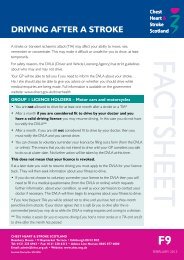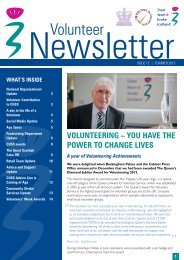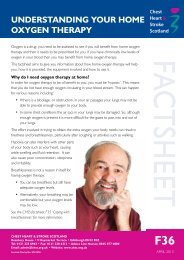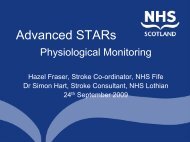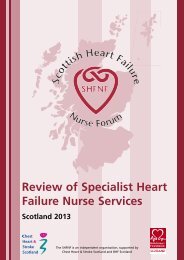CHSS H8 Heart Valves - Chest Heart & Stroke Scotland
CHSS H8 Heart Valves - Chest Heart & Stroke Scotland
CHSS H8 Heart Valves - Chest Heart & Stroke Scotland
You also want an ePaper? Increase the reach of your titles
YUMPU automatically turns print PDFs into web optimized ePapers that Google loves.
HEART SERIES <strong>H8</strong><br />
UNDERSTANDING<br />
HEART VALVE<br />
PROBLEMS
<strong>Chest</strong> <strong>Heart</strong> &<br />
<strong>Stroke</strong> <strong>Scotland</strong><br />
improves the<br />
quality of life for<br />
people in <strong>Scotland</strong><br />
affected by chest,<br />
heart and stroke<br />
illness, through<br />
medical research,<br />
influencing public<br />
policy, advice and<br />
information and<br />
support in the<br />
community.<br />
FUNDRAISING<br />
<strong>Chest</strong> <strong>Heart</strong> & <strong>Stroke</strong> <strong>Scotland</strong> is a wholly independent<br />
Scottish charity. We receive no core funding from<br />
Government or any public body or private agency and<br />
rely entirely on the Scottish public to raise the £7 million<br />
a year we need to help people with chest, heart and stroke<br />
illness throughout <strong>Scotland</strong>.<br />
RESEARCH<br />
We are one of <strong>Scotland</strong>’s largest charitable funders of<br />
medical research, with a programme worth over £600,000<br />
a year. We fund research projects throughout <strong>Scotland</strong><br />
into all aspects of the prevention, diagnosis, treatment and<br />
social impact of chest, heart and stroke illness.<br />
PERSONAL SUPPORT GRANTS<br />
We provide small grants to people in financial difficulty,<br />
because of chest, heart or stroke illness, for items ranging<br />
from disability equipment and household goods to respite<br />
care and holidays.<br />
VOLUNTEER SERVICES<br />
We give support to people whose communication skills<br />
are impaired after a stroke and those living with heart<br />
failure. The Volunteer <strong>Stroke</strong> Service (VSS) provides<br />
weekly group meetings and home visits for patients. The<br />
<strong>Heart</strong> Failure Support Service (HFSS) provides volunteer<br />
befrienders to reduce social isolation.<br />
<strong>CHSS</strong> NURSES<br />
Our nurses provide independent practical advice and<br />
support to those who have chest, heart and stroke<br />
illnesses, their families, carers and health professionals.<br />
There are dedicated nursing services in Fife, Forth Valley,<br />
Grampian, Highland, Lanarkshire, Lothian and Dumfries<br />
and Galloway. There is also a <strong>Scotland</strong> wide nurse led<br />
Advice Line (0845) 077 6000. Calls are charged at a local<br />
call rate (out of hours answerphone). We have a wide<br />
range of booklets, factsheets and videos on chest, heart<br />
and stroke illnesses.<br />
COMMUNITY SUPPORT NETWORK<br />
<strong>CHSS</strong> provides support to affiliated chest, heart and<br />
stroke clubs through the Community Support Network.<br />
The clubs are independent and are run by local volunteers.<br />
The groups provide a range of activities and offer people<br />
support, stimulation and companionship in a friendly and<br />
relaxed environment. Please ask for more information.<br />
FOR FURTHER INFORMATION ABOUT ANY OF<br />
THE SERVICES ABOVE PLEASE CONTACT HEAD<br />
OFFICE BY PHONING 0131 225 6963 OR VISIT<br />
www.chss.org.uk
U N D E R S T A N D I N G H E A R T V A L V E P R O B L E M S<br />
CONTENTS<br />
What are heart valves? 2<br />
What can go wrong with heart valves? 3<br />
UNDERSTANDING<br />
HEART VALVE<br />
PROBLEMS<br />
What are the causes of heart valve<br />
problems? 4<br />
What are the symptoms of heart valve<br />
problems? 5<br />
How are heart valve problems<br />
diagnosed? 6<br />
How are heart valve problems treated? 7<br />
What can I do to help myself? 11<br />
Who should I tell? 12<br />
Useful addresses and websites 13<br />
1
U N D E R S T A N D I N G H E A R T V A L V E P R O B L E M S<br />
WHAT ARE HEART VALVES?<br />
The heart is a muscular pump, made up of four<br />
chambers. These chambers have to pump<br />
regularly and in sequence to ensure an adequate<br />
blood supply to the whole body. The movement<br />
of blood through the heart is regulated by a<br />
series of valves which ensure that the blood<br />
flows smoothly in a single direction.<br />
There are four valves within the heart: mitral,<br />
tricuspid, aortic and pulmonary. Each valve is<br />
made up of a thin ‘flap’ of strong tissue. When<br />
the valves are working properly they open and<br />
close fully. As valves can only open in one<br />
direction this prevents a backflow of blood.<br />
Figure 1. Diagram of heart valves<br />
Pulmonary valve<br />
Aortic valve<br />
Left atrium<br />
Right atrium<br />
Tricuspid valve<br />
Mitral valve<br />
Right ventricle<br />
2<br />
Left ventricle
U N D E R S T A N D I N G H E A R T V A L V E P R O B L E M S<br />
WHAT CAN GO WRONG WITH<br />
HEART VALVES?<br />
If any of the four valves are diseased or<br />
damaged the flow of blood through the heart is<br />
affected and the heart cannot work efficiently<br />
enough.<br />
There are two main ways that valves can be<br />
affected:<br />
• <strong>Valves</strong> can leak.<br />
The valve does not close firmly enough to<br />
prevent the blood in the chamber leaking back<br />
through the valve. This is called valve<br />
regurgitation.<br />
The heart has to work harder as it tries to<br />
cope with the normal flow of blood as well as<br />
the extra blood that has leaked back through<br />
the valve.<br />
• <strong>Valves</strong> can narrow.<br />
The opening of the valve is narrowed and can<br />
not open fully, restricting blood flow between<br />
chambers. This is called valve stenosis. The<br />
heart has to work harder to overcome this<br />
restriction.<br />
<strong>Heart</strong> valves can leak and narrow at the same<br />
time and it is possible for more than one heart<br />
valve to be affected. Both leaking and<br />
narrowing valves can place additional strain<br />
on the heart muscle.<br />
The aortic and mitral valves, on the left side of<br />
the heart, are most commonly affected.<br />
3
U N D E R S T A N D I N G H E A R T V A L V E P R O B L E M S<br />
WHAT ARE THE CAUSES Of<br />
HEART VALVE PROBLEMS?<br />
Possible causes include:<br />
• Coronary artery disease: this can commonly<br />
contribute to a leaky mitral valve.<br />
• High blood pressure: this can commonly<br />
contribute to a leaky aortic valve.<br />
• Getting older: age causes the aortic valve to<br />
harden and narrow.<br />
• Wear and tear can cause valves to leak.<br />
• Infection can lead to damage causing aortic<br />
or mitral leaking. Rheumatic fever during<br />
childhood (or teenage years) used to be the<br />
main cause of heart valve damage. However,<br />
rheumatic fever is now rare in the UK.<br />
• Congenital heart problems: e.g. being born<br />
with an abnormal aortic valve can cause<br />
aortic regurgitation. Congenital valve<br />
problems often do not cause any problems<br />
until adulthood, when premature wear and<br />
tear may occur.<br />
• Cardiomyopathy (disease of the heart<br />
muscle).<br />
4
U N D E R S T A N D I N G H E A R T V A L V E P R O B L E M S<br />
WHAT ARE THE SyMPTOMS Of<br />
HEART VALVE PROBLEMS?<br />
Some people are not aware that they have a<br />
heart valve problem because the heart is coping<br />
and they don’t have any symptoms. However<br />
damaged heart valves increase the workload of<br />
the heart and can place additional strain on the<br />
heart muscle. In time, depending on which heart<br />
valve is affected and how badly, symptoms can<br />
appear.<br />
These include:<br />
• shortness of breath<br />
• ankle swelling<br />
• increased tiredness<br />
• chest pain (angina) or palpitations (increased<br />
awareness of your heartbeat)<br />
• dizziness and / or fainting<br />
Your doctor may discover a valve problem<br />
when these symptoms are investigated.<br />
5
U N D E R S T A N D I N G H E A R T V A L V E P R O B L E M S<br />
HOW ARE HEART VALVE<br />
PROBLEMS DIAGNOSED?<br />
Sometimes a problem with a heart valve is<br />
picked up when your doctor, or specialist nurse,<br />
listens to your heart through a stethoscope. This<br />
can be as part of a routine examination or<br />
because you have symptoms such as tiredness,<br />
shortness of breath or swelling of the ankles.<br />
If there is damage to a valve then he / she may<br />
hear a ‘murmur’. This noise is extra to the<br />
normal sounds of a heart beat and can be caused<br />
by a damaged valve.<br />
Your doctor may refer you to a cardiologist<br />
(specially trained heart doctor) for more tests to<br />
assess any damage to the valve(s) as well as the<br />
general condition of your heart and coronary<br />
arteries. These tests can include:<br />
• ECG: stands for electrocardiogram. This gives<br />
a recording of the electrical activity of the<br />
heart in the form of a graph.<br />
• <strong>Chest</strong> x-ray.<br />
• Echocardiogram: also referred to as an ‘echo’<br />
this is an ultrasound scan of the heart.<br />
• Angiogram: also called cardiac<br />
catheterisation. This is an x-ray examination<br />
of the coronary arteries.<br />
6
U N D E R S T A N D I N G H E A R T V A L V E P R O B L E M S<br />
HOW ARE HEART VALVE<br />
PROBLEMS TREATED?<br />
Once a diagnosis of a heart valve problem has<br />
been made your doctor will decide what<br />
treatment, if any, is best for you. Any underlying<br />
problems (e.g. coronary artery disease and high<br />
blood pressure) will also need to be treated.<br />
Monitoring<br />
If the valves are not badly affected and you do<br />
not have any symptoms then you may not need<br />
any treatment. You will, instead, need regular<br />
check ups (including regular echocardiograms)<br />
to see how well the heart is working. This will<br />
usually be at the cardiology out-patient<br />
department.<br />
7
U N D E R S T A N D I N G H E A R T V A L V E P R O B L E M S<br />
Medical treatment<br />
There are various drugs which your doctor may<br />
prescribe to ease the workload of the heart and<br />
relieve symptoms. For example:<br />
• ACE inhibitors: reduce blood pressure and<br />
increase cardiac output (improve the<br />
efficiency of the heart).<br />
• Anti-arrhythmics: correct fast or irregular<br />
heart beats (arrhythmias).<br />
• Beta blockers: reduce blood pressure, lower<br />
heart rate and ease workload of the heart.<br />
• Diuretics (‘water’ tablets): remove excess<br />
fluid from the body by increasing urine<br />
volume. This lowers the blood pressure and<br />
eases the workload of the heart.<br />
See the <strong>CHSS</strong> booklet ‘Understanding <strong>Heart</strong><br />
Disease’ for more information on drugs and<br />
tests used in heart disease.<br />
8
U N D E R S T A N D I N G H E A R T V A L V E P R O B L E M S<br />
Surgical treatment<br />
In the longer term your doctor may recommend<br />
heart surgery to stretch, repair or replace the<br />
damaged valve.<br />
Balloon valve surgery<br />
A narrowed valve can sometimes be stretched.<br />
This is most often performed for treating mitral<br />
valve stenosis and is called mitral valvuloplasty.<br />
During this procedure a small tube (called a<br />
catheter) is inserted into a major artery (usually<br />
in your groin) and then guided up to your heart.<br />
A wire, with a tiny inflatable balloon, is passed<br />
through the catheter and when it reaches the<br />
damaged valve the balloon is inflated to stretch<br />
the valve. The balloon is then deflated and the<br />
catheter and balloon are removed.<br />
This type of surgery does not involve open-heart<br />
surgery and can be as effective as replacement<br />
surgery.<br />
Valve repair<br />
If at all possible surgeons will try to repair a<br />
damaged valve as it is a less invasive procedure<br />
than valve replacement surgery. Valve repair<br />
surgery is most commonly performed for<br />
treating mitral valve regurgitation.<br />
Valve replacement surgery<br />
If the valve cannot be repaired then it may be<br />
replaced. Replacement valves can be either<br />
artificial mechanical valves made of metal and<br />
plastic or natural tissue valves from pigs<br />
(porcine).<br />
Not everyone will be suitable for this type of<br />
surgery.<br />
9
U N D E R S T A N D I N G H E A R T V A L V E P R O B L E M S<br />
It is important to discuss all the advantages and<br />
disadvantages of valve replacement surgery with<br />
your doctor. Complications of valve<br />
replacement surgery include:<br />
• Bleeding following surgery.<br />
• Blood clots: usually you will be given blood<br />
thinning medicines (e.g. warfarin or aspirin)<br />
to help to prevent this.<br />
• Endocarditis: the new valve can become<br />
infected or inflamed. You will be given<br />
antibiotics to help to prevent this.<br />
Mechanical valves last much longer but require<br />
long-term treatment with warfarin. Warfarin is a<br />
blood thinner (anticoagulant) that is used as part<br />
of the treatment to prevent clots from forming.<br />
Warfarin must only be used under very close<br />
medical supervision.<br />
Tissue valves may not last as long as<br />
mechanical ones and need to be replaced after<br />
approximately 10 years. If you have a tissue<br />
valve replacement then you will have to take<br />
aspirin but you will not need to take warfarin.<br />
See the <strong>CHSS</strong> factsheet ‘Warfarin’ for more<br />
information.<br />
10
U N D E R S T A N D I N G H E A R T V A L V E P R O B L E M S<br />
WHAT CAN I DO TO HELP<br />
MySELf?<br />
It is important that you take any prescribed<br />
drugs regularly and discuss any troublesome<br />
side effects, as well as any new symptoms, with<br />
your doctor.<br />
In order to relieve the pressure on your heart it<br />
is advisable to try to do what you can to reduce<br />
the risk of further heart problems i.e.<br />
• control and monitor blood pressure<br />
• control and monitor cholesterol levels<br />
• control and monitor diabetes<br />
• stop smoking<br />
• eat a healthy varied diet<br />
• control your weight<br />
• keep active<br />
• moderate your alcohol intake<br />
See the <strong>CHSS</strong> booklet ‘Reducing the risks of<br />
<strong>Heart</strong> Disease’ for more information.<br />
11
U N D E R S T A N D I N G H E A R T V A L V E P R O B L E M S<br />
WHO SHOULD I TELL?<br />
As people with heart valve problems have an<br />
increased risk of a rare condition called<br />
Infective Endocarditis it is advisable to inform<br />
your doctor, or dentist, about your condition<br />
before you have any invasive treatment. They<br />
will assess you and decide if you need to take<br />
antibiotics prior to your treatment.<br />
12
U N D E R S T A N D I N G H E A R T V A L V E P R O B L E M S<br />
Blood Pressure Association<br />
60 Cranmer Terrace<br />
London<br />
SW17 0QS<br />
Blood Pressure Information line: 0845 241 0989<br />
Line open 11am to 3pm Monday to Friday.<br />
Tel: 0208 772 4994<br />
Website: www.bpassoc.org.uk<br />
The Blood Pressure Association is the UK-wide<br />
charity dedicated to lowering the nation’s blood<br />
pressure. Their aim is to prevent unnecessary<br />
death and disability from heart disease, heart<br />
attacks and stroke caused by high blood<br />
pressure.<br />
Free on line membership and a full subscription<br />
membership available.<br />
British <strong>Heart</strong> foundation <strong>Scotland</strong><br />
Ocean Point One<br />
94 Ocean Drive<br />
Edinburgh<br />
EH6 6JH<br />
<strong>Heart</strong> Information Line: 0300 330 3311<br />
(open Monday to Friday 9am - 5pm)<br />
Website: www.bhf.org.uk<br />
The British <strong>Heart</strong> Foundation provides free,<br />
confidential information, help and support on<br />
all heart health issues through their helpline.<br />
They invest in pioneering research and support<br />
and care for heart patients.<br />
USEfUL<br />
ADDRESSES AND<br />
WEBSITES<br />
13
U N D E R S T A N D I N G H E A R T V A L V E P R O B L E M S<br />
The Cardiomyopathy Association<br />
Unit 10, Chiltern Court<br />
Asheridge Road<br />
Chesham<br />
Bucks<br />
HP5 2PX<br />
Helpline: 0800 018 1024<br />
(Monday to Friday 8.30am - 4.30pm)<br />
Website: www.cardiomyopathy.org<br />
The Cardiomyopathy Association provides<br />
information on the main forms of the heart<br />
muscle disease known as cardiomyopathy.<br />
<strong>Chest</strong> <strong>Heart</strong> & <strong>Stroke</strong> <strong>Scotland</strong><br />
Rosebery House<br />
9 Haymarket Terrace<br />
Edinburgh EH12 5EZ<br />
Tel: 0131 225 6963<br />
Fax: 0131 220 6313<br />
Advice Line: 0845 077 6000<br />
Email: adviceline@chss.org.uk<br />
Website: www.chss.org.uk<br />
<strong>Chest</strong> <strong>Heart</strong> & <strong>Stroke</strong> <strong>Scotland</strong> improves the<br />
quality of life for people in <strong>Scotland</strong> affected by<br />
chest, heart and stroke illness, through medical<br />
research, influencing public policy, advice and<br />
information and support in the community.<br />
14
U N D E R S T A N D I N G H E A R T V A L V E P R O B L E M S<br />
Grown Up Congenital <strong>Heart</strong> (GUCH)<br />
Patients Association<br />
Saracen’s House<br />
25 St Margaret’s Green<br />
Ipswich<br />
IP4 2BN<br />
Helpline: 0800 854759<br />
(Answerphone out of hours)<br />
Tel: 01473 252 007<br />
Email: admin@guch.org.uk<br />
Website: www.guch.org.uk<br />
GUCH Patients association supports young<br />
people and adults with congenital heart disease.<br />
<strong>Heart</strong> UK<br />
7 North Road<br />
Maidenhead SL6 1PE<br />
Helpline: 0845 450 5988<br />
(open Monday to Friday 10am - 3pm)<br />
Email: ask@heartuk.org.uk<br />
Website: www.heartuk.org.uk<br />
HEART UK is a national charity for patients<br />
and their families which combines the rich skills<br />
of research scientists and the caring and<br />
knowledgeable attention of doctors, nurses and<br />
dietitians, in order to support all those at risk of<br />
inherited high cholesterol and cardiovascular<br />
disease.<br />
15
U N D E R S T A N D I N G H E A R T V A L V E P R O B L E M S<br />
Contact the <strong>Chest</strong> <strong>Heart</strong> &<br />
<strong>Stroke</strong> <strong>Scotland</strong> Advice Line<br />
nurses for confidential,<br />
independent advice.<br />
The line is open<br />
Monday – Friday<br />
9.30 – 4.00<br />
0845 077 6000 or<br />
0131 225 6963<br />
Out of hours answering machine.<br />
Email: adviceline@chss.org.uk<br />
16<br />
The information contained in this booklet is based on<br />
current guidelines and is correct at time of printing. The<br />
content is also put out to peer, patient and expert review. If<br />
you have any comments about this booklet please contact<br />
Lorna McTernan, Health Information Manager, at the<br />
address on the facing page.
HEART PUBLICATIONS<br />
H1<br />
H2<br />
H3<br />
H4<br />
H5<br />
H6<br />
H7<br />
<strong>H8</strong><br />
H9<br />
H10<br />
Booklets<br />
Living with Angina<br />
Reducing the Risk of <strong>Heart</strong> Disease<br />
Understanding <strong>Heart</strong> Disease<br />
Living with High Blood Pressure<br />
Living with <strong>Heart</strong> Failure<br />
Living with a Pacemaker<br />
<strong>Heart</strong> Attack: A Guide to your<br />
Recovery<br />
Understanding <strong>Heart</strong> Valve Problems<br />
Understanding Atrial Fibrillation<br />
Living with an ICD<br />
Videos and DVDs<br />
H5V Living with <strong>Heart</strong> Failure Video: £5.00<br />
H5D Living with <strong>Heart</strong> Failure DVD: £5.00<br />
H7V <strong>Heart</strong> Attack: A guide Video: £5.00<br />
H7D <strong>Heart</strong> Attack: A guide DVD: £5.00<br />
f2<br />
f3<br />
f4<br />
f6<br />
f7<br />
f8<br />
f13<br />
f17<br />
f18<br />
f19<br />
f20<br />
f21<br />
f22<br />
f23<br />
f24<br />
f26<br />
f28<br />
f30<br />
factsheets - free<br />
Salt<br />
Cholesterol<br />
Warfarin<br />
Holidays<br />
Insurance companies<br />
Suggested booklist<br />
Air travel for people affected by chest, heart<br />
and stroke illness<br />
Diabetes: links with heart disease and stroke<br />
Coping with tiredness<br />
Managed Clinical Networks and You<br />
Illustrated risk factors (ethnic target)<br />
Illustrated risk factors (general target)<br />
How to make the most of a visit to<br />
your doctor<br />
Living with stress and anxiety<br />
Healthy eating<br />
Understanding help in the community<br />
Glossary<br />
Just move!<br />
A full publication list is available from Head Office.<br />
Rosebery House, 9 Haymarket Terrace, Edinburgh EH12 5EZ<br />
Tel: 0131 225 6963<br />
ORDER FORM<br />
Please send me the following:<br />
TITLE<br />
No. of copies<br />
Up to 100 booklets free, up to 100 factsheets free<br />
If you wish to order more than 100 booklets or factsheets please<br />
contact the Health Information department at the address above.<br />
Name: ________________________________________<br />
Address:_______________________________________<br />
______________________________________________<br />
Postcode: ______________ Tel: ____________________
WHERE TO FIND US<br />
Head Office<br />
Tel: 0131 225 6963<br />
Fax: 0131 220 6313<br />
Rosebery House<br />
9 Haymarket Terrace<br />
Edinburgh EH12 5EZ<br />
Open Mon – Fri<br />
Glasgow<br />
Tel: 0141 633 1666<br />
Fax: 0141 633 5113<br />
103 Clarkston Road<br />
Glasgow G44 3BL<br />
Open Mon – Fri<br />
Inverness<br />
Tel: 01463 713 433<br />
Fax: 01463 713 699<br />
5 Mealmarket Close<br />
Inverness IV1 1HT<br />
Open Mon – Fri<br />
www.chss.org.uk<br />
<strong>Chest</strong> <strong>Heart</strong> & <strong>Stroke</strong> <strong>Scotland</strong> is a wholly<br />
independent Scottish charity. We receive no core<br />
funding from Government or any public body or<br />
private agency.<br />
We need your help to achieve our aim of<br />
improving the lives of those in <strong>Scotland</strong> with<br />
chest, heart and stroke illness. You can help by<br />
volunteering your time with our services, by<br />
supporting your local Regional office or as a<br />
fundraiser. You can help by giving now and in<br />
the future, by making a donation, organising a<br />
local fundraising event, leaving us a gift in your<br />
will or by setting up a regular Direct Debit.<br />
Designed by Creative Link, North Berwick<br />
If you would like to speak to one of our Advice<br />
Line nurses in confidence, phone<br />
<strong>Chest</strong> <strong>Heart</strong> & <strong>Stroke</strong> <strong>Scotland</strong> Advice Line.<br />
Monday – Friday<br />
9.30am – 4.00pm<br />
0845 077 6000 or<br />
0131 225 6963<br />
Email us: adviceline@chss.org.uk<br />
There is a text relay service for the hearing-impaired.<br />
Registered with and regulated by the Office of the Scottish Charity Regulator (charity no SC 018761),<br />
<strong>Chest</strong> <strong>Heart</strong> & <strong>Stroke</strong> <strong>Scotland</strong> and <strong>CHSS</strong> are operating names of The <strong>Chest</strong>, <strong>Heart</strong> & <strong>Stroke</strong><br />
Association <strong>Scotland</strong>. Also registered in <strong>Scotland</strong> as a company limited by guarantee, no SC129114.<br />
March 2012


